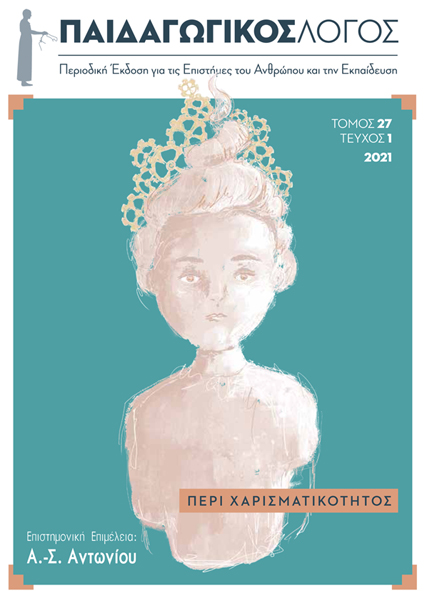Αίτια που Οδηγούν στην Υποεπίδοση των Χαρισματικών Παιδιών
Аннотация
Η υποεπίδοση των χαρισματικών παιδιών αποτελεί θέμα που έχει διερευνηθεί συστηματικά τα τελευταία χρόνια. Ο εννοιολογικός διαχωρισμός ανάμεσα σε χαρισματικότητα και επίτευξη έχει οδηγήσει σε μια συνεχή μελέτη των παραγόντων που συμβάλλουν στην υποεπίδοση των χαρισματικών νέων. Οι παράγοντες κατηγοριοποιούνται κυρίως σε ενδοπροσωπικούς και διαπροσωπικούς. Τα χαρισματικά παιδιά που στερούνται οικογενειακής υποστήριξης είναι περισσότερο πιθανό να εμφανίσουν υποεπίδοση. Η σημασία ενός υποστηρικτικού οικογενειακού και σχολικού περιβάλλοντος αναδεικνύεται στην πλειονότητα των ερευνών. Οι σημαντικοί άλλοι στη ζωή του παιδιού φαίνεται ότι αποτελούν έναν αντισταθμιστικό παράγοντα στα αρνητικά αποτελέσματα. Αντίθετα, ένα σχολικό σύστημα, το οποίο είναι ανέτοιμο να ανταποκριθεί στις ανάγκες του παιδιού μπορεί να συμβάλει στην κοινωνική, συναισθηματική και ακαδημαϊκή περιθωριοποίησή του. Ένα σημαντικό ποσοστό χαρισματικών παιδιών αποσύρεται, εμφανίζοντας κοινωνικές και συναισθηματικές δυσκολίες σε συνδυασμό με υποεπίδοση. Η αναγκαιότητα σχεδιασμού εκπαιδευτικών συστημάτων προσαρμοσμένων στις εξαιρετικές ικανότητες των χαρισματικών μαθητών γίνεται ολοένα και πιο επιτακτική. Οι προαπαιτούμενες αλλαγές του εκπαιδευτικού συστήματος θα πρέπει να είναι ριζικές και να συμπεριλαμβάνουν την οικογένεια ως σύστημα. Η εύρεση και κατανόηση των παραγόντων υποεπίδοσης των χαρισματικών παιδιών αποτελεί τη βάση ενός επιτυχημένου εκπαιδευτικού συστήματος.
Article Details
- Как цитировать
-
Ξυπολιτά Ε., & Αντωνίου Α.-Σ. (2021). Αίτια που Οδηγούν στην Υποεπίδοση των Χαρισματικών Παιδιών. Παιδαγωγικός Λόγος, 27(1), 33–56. https://doi.org/10.12681/plogos.27907
- Раздел
- Articles

Это произведение доступно по лицензии Creative Commons «Attribution-NonCommercial-NoDerivatives» («Атрибуция — Некоммерческое использование — Без производных произведений») 4.0 Всемирная.
Οι Συγγραφείς που δημοσιεύουν εργασίες τους σε αυτό το περιοδικό συμφωνούν στους παρακάτω όρους:
- Οι Συγγραφείς διατηρούν τα Πνευματικά Δικαιώματα και χορηγούν στο περιοδικό το δικαίωμα της πρώτης δημοσίευσης, ενώ ταυτόχρονα τα πνευματικά δικαιώματα της εργασίας προστατεύονται σύμφωνα με την χρήση άδειας που υιοθετεί ο «Παιδαγωγικός Λόγος - Περιοδική Έκδοση για τις Επιστήμες του Ανθρώπου και την Εκπαίδευση» : Αναφορά Δημιουργού – Μη Εμπορική Χρήση – Όχι Παράγωγα Έργα 4.0 (CC BY-NC-ND). Αυτή η άδεια επιτρέπει στους άλλους να έχουν πρόσβαση στο έργο και να το μοιράζονται με άλλους, εφόσον κάνουν αναφορά σε αυτό, ωστόσο δεν μπορούν να το αλλάξουν με κανένα τρόπο ούτε να το χρησιμοποιούν για εμπορική χρήση.
- Οι συγγραφείς μπορούν να συνάπτουν ξεχωριστές και πρόσθετες συμβάσεις και συμφωνίες για τη μη αποκλειστική διανομή της εργασίας, όπως δημοσιεύτηκε στο περιοδικό αυτό (π.χ. κατάθεση σε ένα ακαδημαϊκό καταθετήριο ή δημοσίευση σε ένα βιβλίο), με την προϋπόθεση της αναγνώρισης και την αναφοράς της πρώτης δημοσίευσης σε αυτό το περιοδικό.
- Το περιοδικό επιτρέπει και ενθαρρύνει τους συγγραφείς να καταθέτουν τις εργασίες τους μέσω διαδικτύου (π.χ. σε ένα ακαδημαϊκό καταθετήριο ή στους προσωπικές τους ιστοσελίδες) πριν και μετά από τις διαδικασίες της δημοσίευσης, καθώς αυτό μπορεί να οδηγήσει σε παραγωγική ανταλλαγή ιδεών και σκέψεων, καθώς επίσης και σε γρηγορότερη και μεγαλύτερη χρήση και ευρετηρίαση της δημοσιευμένης εργασίας



